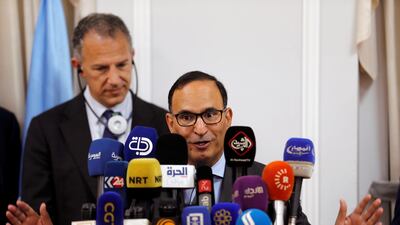Members of the UN Security Council visited Iraq for the first time over the weekend in a trip timed to support the country's recovery and international efforts to hold ISIS accountable for war crimes.
The trip, which was not disclosed in advance for security reasons, came at a sensitive time politically, with many foreigners recently convicted of ISIS membership and hundreds more suspects awaiting trial for their involvement in the insurgency. More than a year after elections, Iraq's leaders have also been dragging their heels on forming a government.
However the visit, jointly organised by the outgoing chair of the council – Kuwait – and the US, welcomed the recent appointment of ministers of justice, defence and the interior, the key offices of state for Iraq's security.
In a statement, the members of the council said the visit underscored their support for post-conflict stabilisation, reconstruction, reconciliation efforts and “emphasised the importance of the sovereignty, unity, territorial integrity, and security of Iraq”. They held meetings with Iraqi Prime Minister Adel Abdul Mahdi, President Barham Salih, Foreign Minister Mohammed Ali Al Hakim and Kurdistan regional government president Nechirvan Barzani as well as other politicians and officials.
The UN's long-running involvement in Iraq includes its assistance mission (UNAMI) but also a recently formed investigative team to promote accountability for crimes committed by ISIS. It is seeking to collect, preserve and store evidence of acts that may amount to war crimes, crimes against humanity, and genocide, a task that will require government support.
The council stressed that the investigative team (UNITAD) would fully respect Iraq's sovereignty but must retain its independence and impartiality in the conduct of its investigation. The UN delegation included the acting US ambassador to the UN Jonathan Cohen, the German permanent representative Christoph Heusgen, and Kuwait's ambassador to the UN Mansour Al Otaibi.
Prior to spending a day in Baghdad, the council visited Kuwait, which is seeking to resolve several issues related to the 1990 invasion of its territory by then Iraqi dictator Saddam Hussein, including efforts to discover the fate of citizens who disappeared during the war and the retrieval of looted national archives.
In its statement the council welcomed progress made in June regarding the recovery of remains in Al Muthanna governorate in Iraq, believed to be of Kuwaiti citizens, including civilians and prisoners of war, as a result of joint efforts between the governments of Iraq, Kuwait and the ICRC.
The trip to Kuwait and Iraq concluded the former's month-long presidency of the council in June. In remarks posted on Twitter, UAE Minister of State for Foreign Affairs Dr Anwar Gargash expressed his appreciation for Kuwait's “professionalism and outstanding performance”.
“Kuwait managed this high priority and represented the Arabs in the most important international diplomatic platforms, a tribute of gratitude from the UAE to Kuwait,” he wrote.


